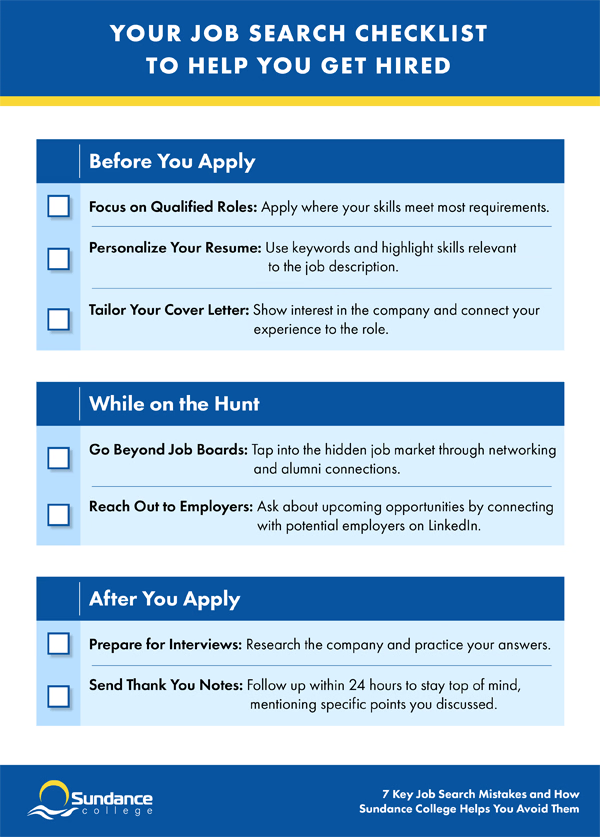Blog / 7 Key Job Search Mistakes and How Sundance College Helps You Avoid Them
7 Key Job Search Mistakes and How Sundance College Helps You Avoid Them

Explore our Diploma Programs
- Business, Hospitality, and Legal
- Health and Human Services
- Technology
- Using a one-size-fits-all resume
- Not tailoring your cover letter
- Over relying on online job ads
- Applying for jobs you’re not qualified for
- Neglecting any networking
- Skipping follow up and thank you notes
- Rushing the process or going unprepared
Table of Contents
How you approach your job search can determine whether you’re noticed by employers or not. Sundance College’s Career Services team offers job search support and has identified common errors that hold candidates back. From one-size-fits-all resumes to skipping follow-ups, these mistakes are easy to correct when you know the right approach.
Here are the seven most common job search mistakes and how to avoid them to achieve career success:
Listen to: 7 Key Job Search Mistakes and How Sundance College Helps You Avoid Them
Mistake #1: Using a One-Size-Fits-All Resume
A generic resume is one of the fastest ways to get passed over. Without resume personalization, your application suggests you didn’t read the job description properly and that you’re likely mass applying to other roles. Employers assume you’re not invested in their role and will move on to other candidates who show real interest.
Even worse, 75% of recruiters and hiring professionals now use Applicant Tracking Systems (ATS) programs in the first stage of the hiring process to scan resumes for specific keywords and formatting before a recruiter ever sees them. Resumes that follow a one-size-fits-all approach are too generic to match specific job criteria, making them likely to be filtered out before they are ever seen by employers.
What to do instead
Personalize your resume for each role by matching key skills and achievements to the job description. Let’s say you’re applying for a job posting that emphasizes customer service. You’ll want to list measurable results that apply to the role’s needs, like how you led a feedback initiative that raised client satisfaction by 30%.
Taking time to customize your resume for every role you apply to helps you make it past screening software and landing an interview.
Mistake #2: Not Tailoring Your Cover Letter
You’re missing the chance to showcase your strengths and enthusiasm when you don’t tailor your cover letter. The hallmarks of a generalized cover letter are mistakes like:
- Failing to mention the job title or company name
- Leaving out where you heard about the role
- Repeating your resume without calling out relevant insights
- Not explaining why you’re interested in that specific role and employer
- Ignoring the job posting’s key requirements
- Lacking any mention of how your skills align with the position
Like a generic resume, not putting enough effort into your cover letter signals to employers you aren’t invested in the position.
What to do instead
When it comes to cover letter support, Sundance College’s Career Services’ Assistant Education Manager, Tim H., explains what details to include:
“Customized applications need to have details that help employers see your value and how you’d contribute to their team, which gives you an edge over other candidates.”
When you frame your experience around the company’s values and the needs of the role, you show employers exactly how you’d fit in.
Mistake #3: Over Relying on Online Job Ads
Spending all your time on job boards limits your opportunities. Many openings are part of the hidden job market and are filled through referrals or networking before they’re ever posted. When you’re relying solely on job ads, you’re up against hundreds of applicants, which lowers your chances of standing out.
What to do instead
Balance online applications with a proactive approach by reaching out to employers or industry contacts directly via social media. LinkedIn can help you connect with them, get career advice, and even find opportunities that may not be posted on job boards yet. For fields like hospitality, where soft skills matter most, in-person applications are the best way to make a strong impression.
Whether it means networking online or getting to know an employer face-to-face, your job search success often comes down to using the right approach for the role you’re pursuing.
Mistake #4: Applying for Jobs You’re Not Qualified For

Sending out dozens of applications for roles you’re not suited for can waste not only your time, but employers’ too. For example, attempting to switch from healthcare to IT without transferable experience or applying to management roles without any history of leadership skills often leads nowhere for both you and the hiring manager. Focusing on qualified applications improves your chances of being taken seriously.
What to do instead
Target roles where you meet most of the listed requirements and highlight transferable skills.
“We help students create an application strategy that draws directly from the skills and experience they’ve built through their hands-on training and practicum.” says Tim H., Career Services’ Assistant Education Manager.
Strategic applications lead to more meaningful opportunities and stronger interview chances.
Mistake #5: Neglecting Networking
Avoiding networking can keep you from learning about valuable opportunities like job openings and referrals. Many positions are shared through alumni connections and professional referrals rather than public postings. Besides your job search, proactive networking is important for career development, creating opportunities to learn about industry events, mentorships, and can help you find another role in the future.
What to do instead
Start building relationships online and in person, even with simple introductions.
“Our networking support includes showing students how to connect with alumni on LinkedIn and asking for career insights as an icebreaker,” says Tim H.
Building these relationships expands your professional circle and can lead to job referrals.
Mistake #6: Skipping Follow Up & Thank You Notes
Not following up after an interview is a missed opportunity to stand out. Thank you notes show professionalism and keep you fresh in the employer’s mind. Skipping this can make it seem like you’re not interested in the role.
What to do instead
Send a short thank you email within 24 hours of an interview. A proper follow-up strategy includes writing an email in a polite, professional tone while referencing specific notes in the email about what you discussed during the interview. For example, bring up how you appreciated learning more about how their team is approaching a certain project, to show you were actively listening and engaged.
Following up is considered good interview etiquette since it helps reinforce your interest and leaves a lasting positive impression.
Mistake #7: Rushing Through the Process or Going Unprepared
Even the strongest candidate can seem unqualified when they’re rushing through applications or not bothering with any interview prep. A single spelling mistake on a resume can make employers question attention to detail and answering a question like “Tell me about a time you handled pressure” with something vague like “I just stay calm” can make you seem unprepared, unqualified, or uninterested. Preparation takes time but being able to clearly communicate your skills and experience is the difference between getting passed over or hired.
What to do instead
Take the time to proofread applications and prepare for common interview questions.
“Our job search support focuses on confidence building by supporting students through resume writing and mock interviews, so they know how to present their experience clearly and respond to interview questions with ease.” says Tim H.
When you take the time to prepare, you’ll be able to showcase your skills and experience in the best possible light for employers.

How Sundance College Helps You Avoid These Mistakes
Sundance College’s Career Services supports student success through the transition from education to employment. From your first resume draft to your first job interview, you’ll have free, lifetime job coaching for every stage of your job search:
- Resume and Cover Letter Support: Learn how to create ATS-friendly resumes and compelling cover letters that get noticed by employers.
- Mock Interviews & Job Search Strategies: Develop strong interview skills and receive assistance on strategic job search planning so you can apply for positions properly and network effectively.
- Employer Connections: Career Services assists with employer referrals and introductions, with many employers reaching out directly to Sundance College when looking for qualified graduates.
Coordinated Practicum Placements
Every Sundance College diploma program includes a practicum placement, which Career Services will help arrange with you. They will assist you in navigating the job market and bring you closer to getting:
- Valuable work experience
- A stronger, achievement-focused resume
- Industry references for your job applications
Many students also find direct employment through their practicum with up to 50% receiving job offers from their practicum employers.
With these resources, Sundance College provides you with the skills, connections, and support to get you hired.
Avoid these mistakes and aim higher. Sundance College’s Career Services team offers job search coaching to help students get hired.
Taking the time to correct these common job search mistakes can make you a stronger candidate in any field. Backed by years of experience working with employers, Sundance College’s Career Services team uses its career authority to assist students through every part of the hiring process. Their ongoing focus on student success helps graduates position themselves for meaningful career opportunities.
FAQ
-
How does resume customization help me avoid job-search mistakes?
Resume customization helps you avoid common job-search mistakes by making sure your skills match the role, which helps you get noticed. Tailored resumes pass ATS scans and show employers you understand their needs.
-
How can building a professional network improve my job search?
A professional network gives you access to opportunities that may never be posted online. Networking support helps you connect with people who can recommend you, reducing common job-search mistakes like relying only on job ads.
-
What should I research before a job interview to avoid mistakes?
Company research is integral in interview preparation since it shows employers you’re serious about the role. Learning about their values, services, and recent projects helps you avoid one of the most common job search mistakes you can make: giving generic answers.
-
How can I create an effective elevator pitch for my job search?
A strong elevator pitch is a compelling self-introduction in 30 seconds. Practicing it helps you avoid job-search mistakes like rambling or sounding unsure when networking or interviewing.
-
Why is it important to update my LinkedIn profile during a job search?
A complete LinkedIn profile improves your online branding and shows you’re active in your job search. Outdated profiles are a common job-search mistake that can make you appear unprepared.
-
Beyond the initial application, what strategies can I use to stand out to employers?
A few job search strategies that can help you stand out to employers after applying are following up with an email, updating your LinkedIn profile with relevant keywords, and reaching out to employees at the company for potential referrals. Post-application tips like preparing for interviews, researching the company, and mentioning any new skills or qualifications can also make a difference. These extra measures show initiative and help you stay top of mind in a competitive hiring process.
Related Blogs
Subscribe for more career advice
Blog Categories
Share on:
